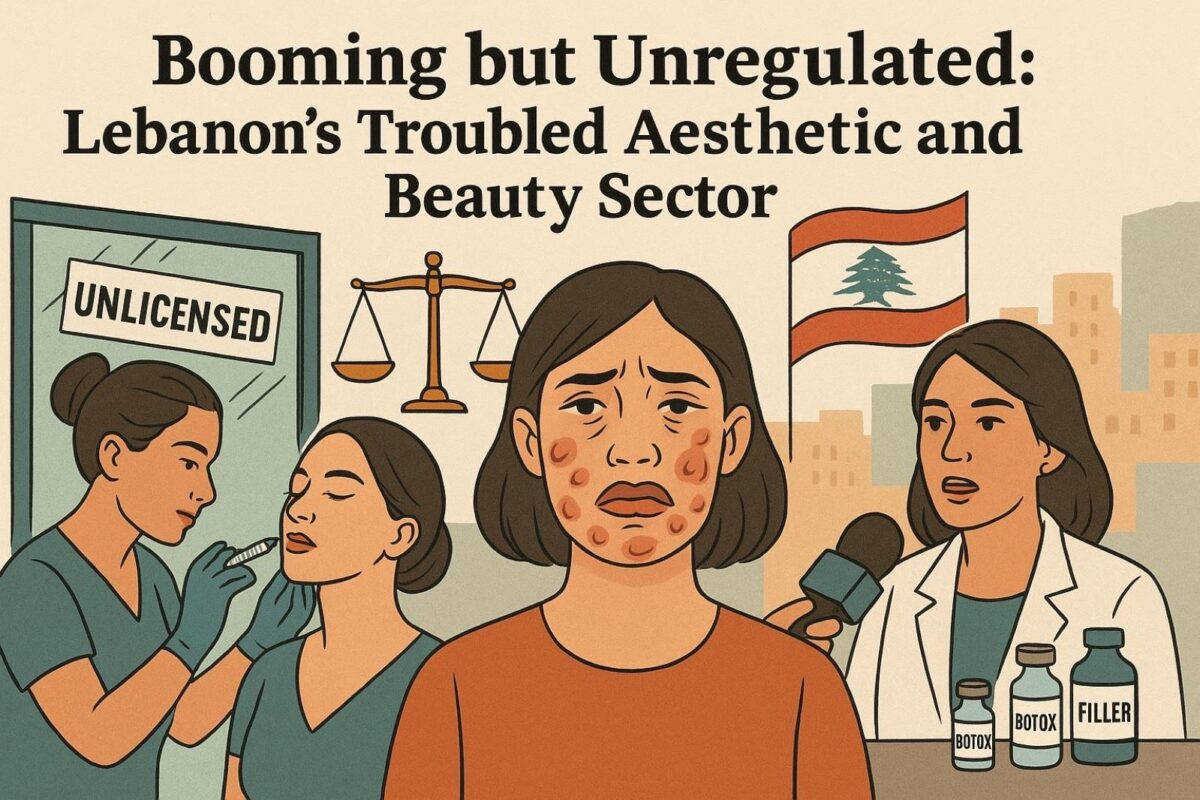
For qualified experts in the aesthetic and beauty sector, the current situation in Lebanon is deeply troubling and chaotic. Many of those performing cosmetic procedures today are completely unqualified as they lack the necessary education, have not undergone proper training, and do not hold any official certification.
For many individuals, it is a scene where the rules are essentially nonexistent, with unauthorized workshops and trainings being held randomly and in clear violation of the law.
Rita Matar, a qualified aesthetic specialist trained in London with extensive experience in Lebanese clinics, noted that many individuals with only a high school education are receiving informal training to administer Botox and filler injections.
“These short courses are often run by beauty salon owners specializing in nail care or makeup,” she explained. “Once the training is completed, the women start presenting themselves as beauty experts and begin offering procedures to clients in the salons,” Rita told NOW.
This practice is often driven by profit and a lack of oversight, which is leading to a growing number of faulty cosmetic procedures and serious health risks.
Under Lebanese regulations, a cosmetic clinic must be officially licensed, and that license can only be granted to a medical professional with specific qualifications. These include specialists in aesthetic medicine, dermatology, plastic surgery, ENT surgery, or maxillofacial surgery.
Furthermore, the license to operate such a facility must be pre-approved by the Minister of Public Health, based on a recommendation from the ministry’s Director General.
In reality, however, these legal requirements are often ignored, leading to a dangerous, unregulated market that puts clients at significant risk.
Advocacy for legal regulations and rules
For months, legal advocacy groups led by university professor and attorney Haitham Azzo have been campaigning against a network of beauty centers in Lebanon falsely claiming to be qualified to perform cosmetic procedures.
While a judicial decision did temporarily shut down this network along with other similar unlicensed establishments, these closures have proven largely ineffective.
According to Haitham, individuals behind these centers are often willing to pay court-imposed fines in exchange for release, only to reopen their salons shortly after.
This legal loophole has become a major weak point in Lebanon’s cosmetic industry, allowing repeat offenders to continue exploiting the country’s reputation in aesthetic medicine for questionable gain.
The seriousness of the crisis has been compounded by the widespread exploitation and the challenges of legal enforcement.
A number of cosmetic doctors are reporting a noticeable rise in cases of disfigurement, skin infections, and other medical complications. The common reasons are the use of cheap, low-quality substances by individuals without official qualifications.
These cost-saving shortcuts, however, are resulting in serious health consequences, revealing a dangerous side to the booming beauty industry in an unregulated and economically strained environment.
Between risk and reward: Lebanese women divided on cosmetic procedures
Some women have faced serious side effects from these procedures. Speaking to NOW Lebanon, Hanaa said that she regularly receives filler injections for her lips, considering it a routine of beauty treatment every few months.
But this time was different. Just hours after her latest procedure, Hanaa experienced severe swelling around her lips, an allergic reaction to the substances used at a new beauty salon her friend had recommended after seeing its results on social media.
On the other hand, Nour says cosmetic enhancements can go wrong or right in any country, not just Lebanon, but the client has to know where they go, and sometimes it is obvious from the prices offered. Despite the financial crisis, she insists she won’t compromise on her appearance. “I only go to qualified doctors, not to untrained individuals who use any imported product in the market and aren’t even licensed,” Nour said.
Risky consequences caused by the procedures
Cosmetic doctors are sounding the alarm. The growing use of cheap, low-quality aesthetic products in Lebanon has led to a surge in serious medical complications.
Reactions such as extreme allergies, facial swelling, bacterial infections, scarring, and even facial disfigurement are becoming increasingly common among patients seeking non-surgical enhancements.
Plastic surgeon Dr. Diana Mostafa explained to NOW Lebanon that complications from cosmetic procedures, particularly Botox and fillers, are on the rise.
These complications are often the result of treatments performed by unqualified individuals, many of whom have no medical background and operate without any state oversight. “Today, we’re seeing that out of every 10 patients, 8 are coming in with complications or disfigurements caused by faulty procedures or unsafe materials,” Dr. Diana said. “The main reason is that people are trying to save money.”
According to her, many women are opting for unlicensed practitioners who charge around $50 or less per session, instead of going to a certified medical professional who may charge $100 or more.
When complications arise, patients often request that the filler or Botox be dissolved, a procedure that itself carries risks and potential side effects.
The role of the Ministry of Public Health
Another critical factor, according to Dr. Diana is the role of pharmaceutical companies and their representatives.
She explains that any company distributing cosmetic products in Lebanon must be registered with the Ministry of Public Health to be authorized to supply original, certified materials, not counterfeit alternatives.
However, due to widespread fraud and corruption in the sector, many beauty products currently in circulation may be fake, leading to harmful results that, unfortunately, show up on women’s faces.
Dr. Diana emphasized that licensed Doctors and aestheticians work only with reputable international suppliers to ensure the quality and safety of the materials they use. “Of course, this affects the cost of procedures, since high-quality, approved products are more expensive,” she said. “But it’s a necessary investment for both the patient’s safety and the doctor’s professional reputation.”
It is urged that stricter oversight and enforcement from the authorities are put in place on medically certified aesthetic clinics in order to avoid serious health risks and permanent facial damage.
Rodayna Raydan is a Lebanese-British journalist. You can follow her on Twitter @Rodayna_462
The views in this story reflect those of the author alone and do not necessarily reflect the beliefs of NOW.








